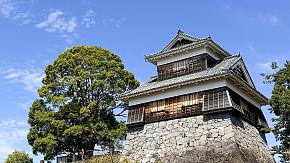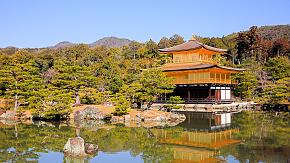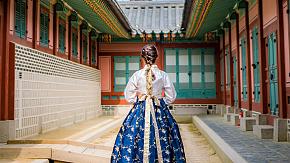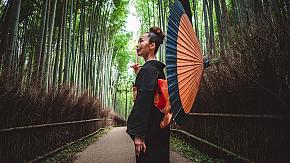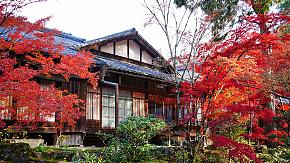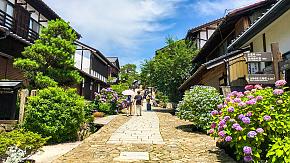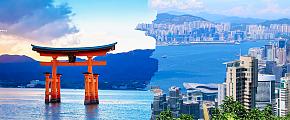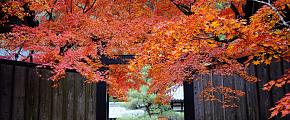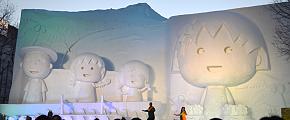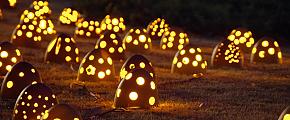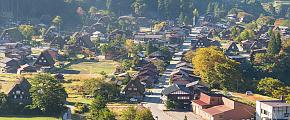Kyushu Fun Facts: Travel Secrets of Southern Japan
If we compare the map of Japan to a lovely hippocampus, then Kyushu Island is its tiny curved tail, full of energy yet seldom visited. That is why today we prepare the top fun facts about Kyushu, from Fukuoka's lively yatai street food stalls to the adorable mascot Kumamon Bear. Discover the southern hidden gem for your next trip to Japan.

- Includes the Southernmost Part of Japan
- A Winter Getaway With Tropical Flavor
- With Spring Flowers More Than Cherry Blossoms
- Kumamoto? Kumamon Bear!
- Culinary Time Capsule: Yatai Street Food
- Where to Find the Best Swordsman
- The Steaming Land of Onsen
- Ancient Forest & Volcano Adventure
- The Nearest Island to the Asian Continent
- Once The Only Window to the Outside World
"Nine Provinces" Including the Southernmost Part of Japan
Nestled in Japan's subtropical southwest, Kyushu stands as the nation's third-largest island - a living tapestry where volcanic landscapes meet azure seas. This geological wonder, along with its 1,400 surrounding islands, once formed the ancient Saikaido region, creating a southern counterpart to the northern frontier, Hokkaido.
The very name Kyushu (九州) whispers its history, meaning "nine provinces" in Japanese. These original administrative divisions have transformed into eight vibrant prefectures that each tell their own story.
Fukuoka, the cultural gateway where modern skyscrapers meet 17th-century samurai castles; Kagoshima, nature's theater of smoking volcanoes and primordial forests; and Okinawa, Japan's southernmost tropical paradise you've probably seen on postcards, is also part of this fascinating wonderland.
 Kyushu Travel Map
Kyushu Travel Map
A Winter Getaway With Tropical Flavor
Kyushu boasts a pleasantly warm and humid climate. With an annual average temperature of around 20℃, even the coldest month of January rarely dips below 10℃, making it one of Japan's most temperate regions.
From early June to mid-July, the rainy season brings higher humidity, nurturing the island's pristine wilderness. Dense primeval forests, scattered offshore islets, and active volcanic formations thrive in these conditions, creating an unspoiled ecosystem that sets Kyushu apart.
Picture this: while Hokkaido up north is all about snowy adventures, down in Kyushu, it offers a tropical twist to your winter holiday.
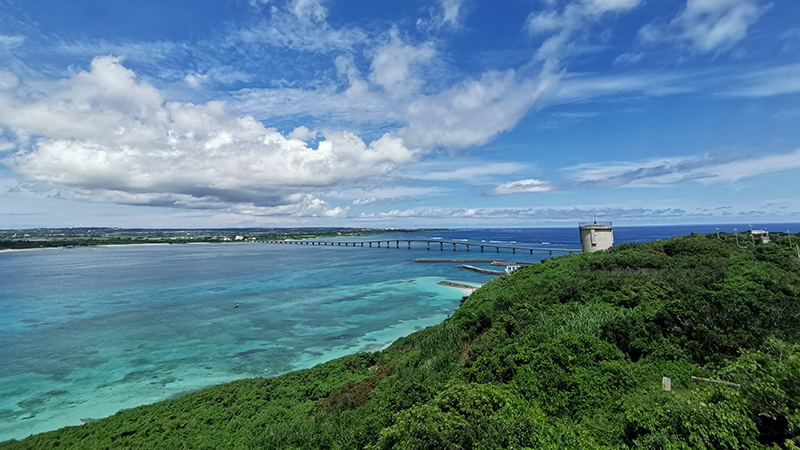 Okinawa
Okinawa
With Spring Flowers More Than Cherry Blossoms
Like its northern neighbor Honshu, Kyushu shares the cherry blossom season in late March, reaching its peak splendor by early April. Maizuru Park is one of the best hanami (cherry blossom viewing) spots in Fukuoka, where the historic Fukuoka Castle Cherry Blossom Festival comes alive with sizzling takoyaki stalls, traditional bonbori lantern illuminations, and locals celebrating under sakura canopies.
While extending your Kyushu adventure into late April, another breathtaking floral spectacle awaits. The Kawachi Wisteria Garden transforms into a fairytale-like wonderland, with cascading purple and white Japanese wisteria floribunda forming mesmerizing flower tunnels.
This botanical wonder holds special significance for anime fans - its otherworldly scenery-inspired settings in the "Kimetsu no Yaiba" (Demon Slayer), created by Fukuoka native Koyoharu Gotouge. Walking through living anime landscapes, where delicate fuji petals dance like the Breath of Flower techniques from the series.
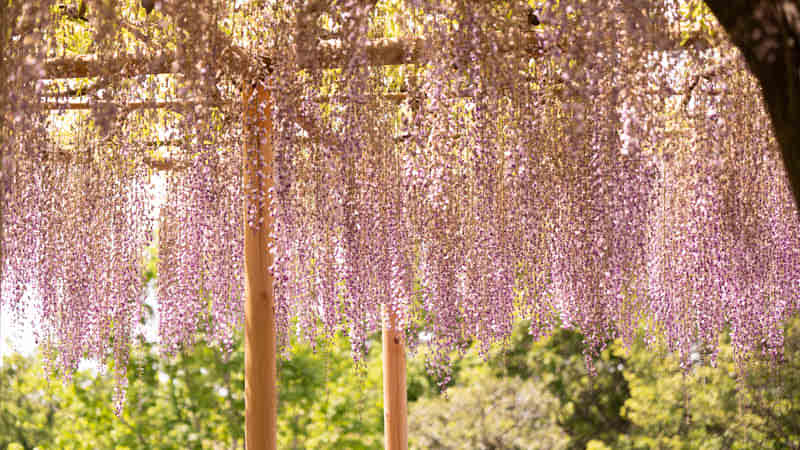 Japanese Wisteria Floribunda in the Kawachi Wisteria Garden
Japanese Wisteria Floribunda in the Kawachi Wisteria Garden
Kumamoto? Kumamon Bear!
While Kumamoto might not ring immediate bells for you, its superstar mascot Kumamon needs no introduction. This chubby-cheeked black bear with a permanent blush and wide, curious eyes is a cultural phenomenon born in 2010 to celebrate the Kyushu Shinkansen's expansion - the round silhouette mirrors Kumamoto Castle's iconic black walls, while his red cheeks symbolize the region's fiery volcanoes.
But here's the twist: Kumamon isn't just a cute face - he is an actual prefectural employee! Holding the prestigious title of Sales Manager (yes, complete with business cards), this hardworking bear promotes his hometown products across the world - he has visited over 20 countries!
During daily appearances at his headquarters in Kumamon Square, you can interact with this smiling bear with his signature "Kumamon Dance" - an infectious hip-swaying routine that's spawned countless viral videos.
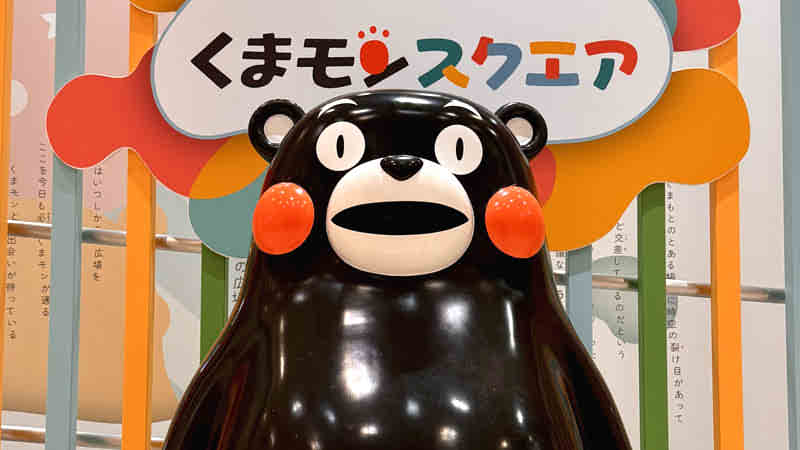 Kumamon Bear
Kumamon Bear
Culinary Time Capsule: Yatai Street Food
For the ultimate Japanese street food pilgrimage, Kyushu's yatai culture is your culinary time capsule. In Fukuoka's neon-lit alleys, these mobile feast stations - resembling Edo-period merchant carts - continue their 150-year legacy as living pieces of edible history.
These compact wooden food wagons, once numbering over 40,000 nationwide during the Meiji era, now survive primarily in Kyushu as moving museums of flavor. Unlike festival-limited stalls elsewhere, here they're nightly neighborhood anchors - no reservations needed, just follow the steam clouds of tonkotsu ramen at dusk.
Arrive as lanterns glow golden around 6 PM. Slide into crimson vinyl stools beneath the noren curtain and point to sizzling skewers. Let the symphony of clanging woks and locals cheer baseball on tiny TVs guide you - this is where Kyushu's soul simmers in miso broth and shares humanity.
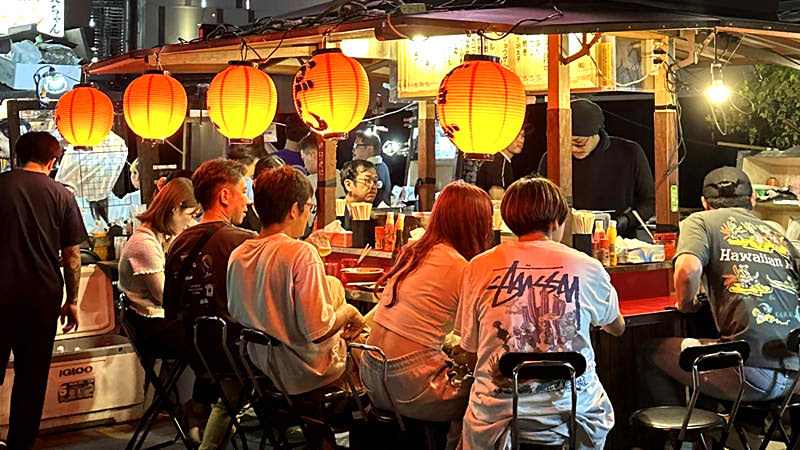 Yatai Food Stall in Fukuoka
Yatai Food Stall in Fukuoka
Where to Find the Best Swordsman
Beyond the clashing of blades in samurai dramas, Kumamoto in Kyushu holds the true legacy of Japan's sword sage - Miyamoto Musashi, who revolutionized combat philosophy by creating the two-sword technique, Niten Ichi-Ryu. However, it is fun to find that this greatest swordsman is not actually a samurai, but a ronin (masterless samurai).
Like a Japanese da Vinci, Musashi's genius transcended the battlefield. Beyond his unbelievable undefeated record in 62 duels that locals always love to debate, Musashi also mastered ink-wash painting and strategic treatises. For your modern pilgrims, you can feel the chill of Reigando Cave where Musashi wrote his magnum opus, The Book of Five Rings, or make your linger at Unganzenji Temple to find his relics and art attributes.
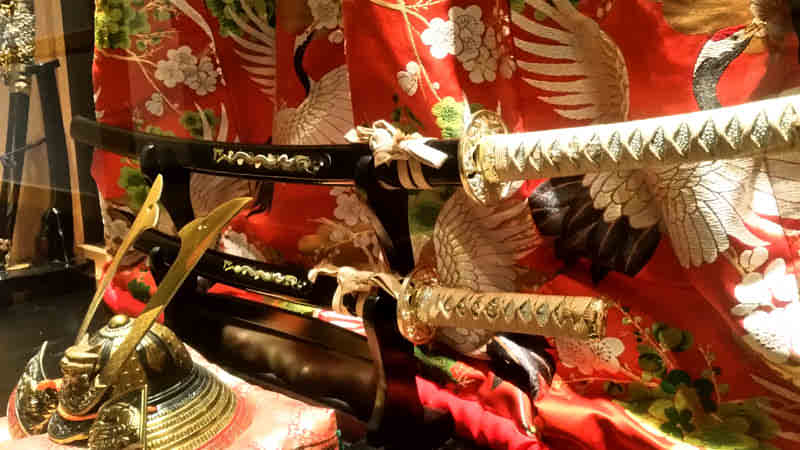 Japanese Swords
Japanese Swords
The Steaming Land of Onsen
When billowing white columns catch your eye in Kyushu's Oita Prefecture, resist the urge to dial emergency services - you're witnessing Beppu's legendary "steamscapes".
These ethereal plumes rising from 2,800 hot springs are the region's living breath, particularly dramatic in Japan's onsen capital Beppu where eight geothermal wonderlands aptly called "Hells" (Jigoku) simmer at 98 to 105°C - making the special steam-cook experience also possible.
Try wrapping your onsen tamago (hot spring egg) or pudding in a handkerchief, and putting them in public geothermal pits. As for the waiting time, wander around the onsen town and take a soothing footbath before enjoying your DIY meal.
There is also a Beppu Hatto stamp pilgrimage for further exploration - collect imprints from 88 steam vents and hot springs to earn your "Onsen Master" certificate. Also, the 7 Hells complex offers 8 stamps in one stop.
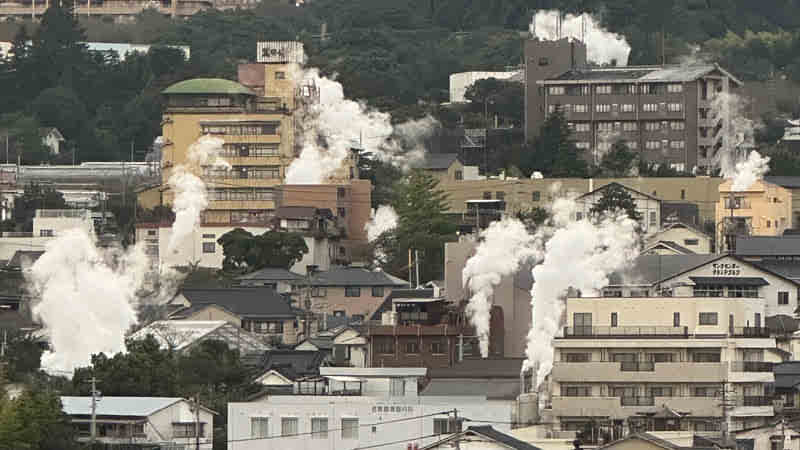 The "Steaming" Oita
The "Steaming" Oita
Ancient Forest & Volcano Adventure
While Japan's geothermal wonders are indeed widespread, Kyushu's wilderness dances to a different rhythm - a primal tango of volcanic fury and moss-clad mysticism that transforms ordinary nature into living art, where you can also capture the sparkle fragment Kujuku Islands like Halong Bay in Vietnam.
Here you can find Yakushima, Japan's wettest realm where annual rainfall hits 10 meters, and ancient cedar trees wear emerald beards of 1,000-year-old moss. Walk the exact trail of Shiratani Unsuikyo Valley, where Hayao Miyazaki sketched Princess Mononoke's kodama (tree spirits), breathing air so pure it's bottled and sold as "Yakushima Kuki".
The caldera of Mount Aso could swallow all of Washington D.C., its fiery heart birthing the ethereal Takachiho Gorge with 100m-high basalt columns. Another fun fact is the ash shower umbrella for residents in Sakurajima, where the daily eruptions of volcanic ash fertilize the sweetest daikon radishes.
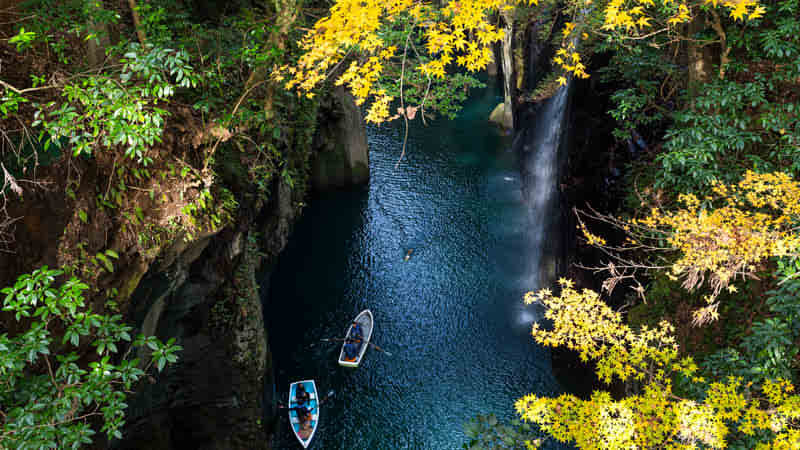 Takachiho Gorge
Takachiho Gorge
The Nearest Island to the Asian Continent
While Tokyo and Osaka glitter as Japan's iconic entry points, Kyushu has its own strategic advantage - the nearest hub to the Asian continent, which floats just 200km from Busan. With Fukuoka Airport's 1-hour Seoul shuttle flights and 2-hour Shanghai connections, Kyushu can be your ultimate springboard for pan-Asian adventures.
Starting in Tokyo and heading south through Kyoto and Osaka, the Golden Triangle offers the best of Japan. Continue on to Kobe and Himeji, where you can stop off for A5 beef and White Heron Castle. Then Hiroshima, always worth a stayover to capture the floating shrine in or out of the tide. Finally, Fukuoka, where to extend your Japan tour of Kyushu before the next episode in Asian Continent.
Once The Only Window to the Outside World
The closer distance between the Asian Continent also made Kyushu the sole keyhole to the world during Japan's 265-year Sakoku, when commerce and foreign relations were strictly regulated under the national seclusion policy.
In northern Kyushu, Nagasaki's Dejima Island served as the only trade port before the black ship shock, but also a stage for cultural alchemy, receiving Commodore Perry's Black Ships in 1853 and welcoming cruise liners from Shanghai today.
Stroll the slopes of Glover Garden where Scottish merchant homes blend Nagasaki tile roofs, visit Japan's oldest wooden church (Oura Cathedral) preserves Portuguese flavor, and witness this culinary crossroads by tasting konpeito, Japan's classic sugar candy in various flavors and colors, as well as the castella (Nagasaki Cake), the sponge cake once evolved into Nagasaki's symbol.
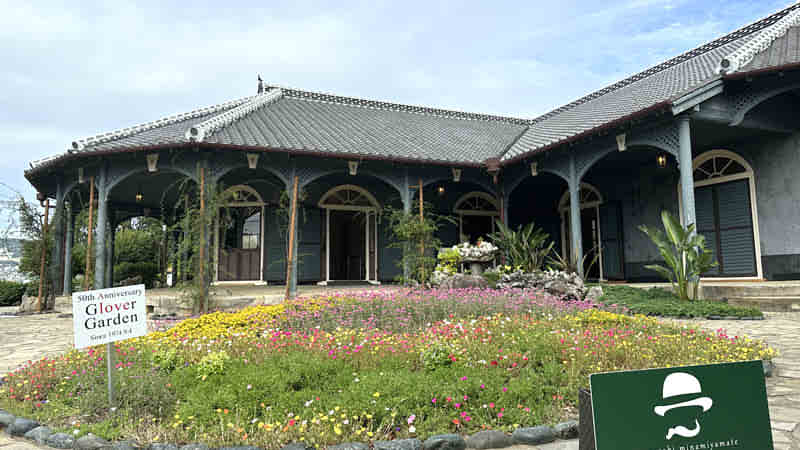 Glover Garden
Glover Garden
With Odynovo, Capture All the Fun Facts About Kyushu
All in all, Kyushu is an interesting land worth visiting to discover every fun fact. With the Shinkansen connecting most parts from south to north, it is perfect for a themed tour to capture all the energy behind this fertile land. Whether it is the legendary swordsman Musashi or the start of the Kumamon bear, please contact us for your carefree Kyushu exploration.
Quick Question
Related Posts You May Like
What Our Clients Say
Explore the latest verified reviews of Odynovo's travel services on Tripadvisor, Google, Trustpilot, Product Review and more trusted platforms.
SUBSCRIBE TO WIN A FREE TOUR
Subscribe to our newsletter for a chance to win a free 7-day tour to India! And more insider travel news, exclusive offers, and inspiration will be sent straight to your inbox. Check our previous newsletters and get some sparks.

